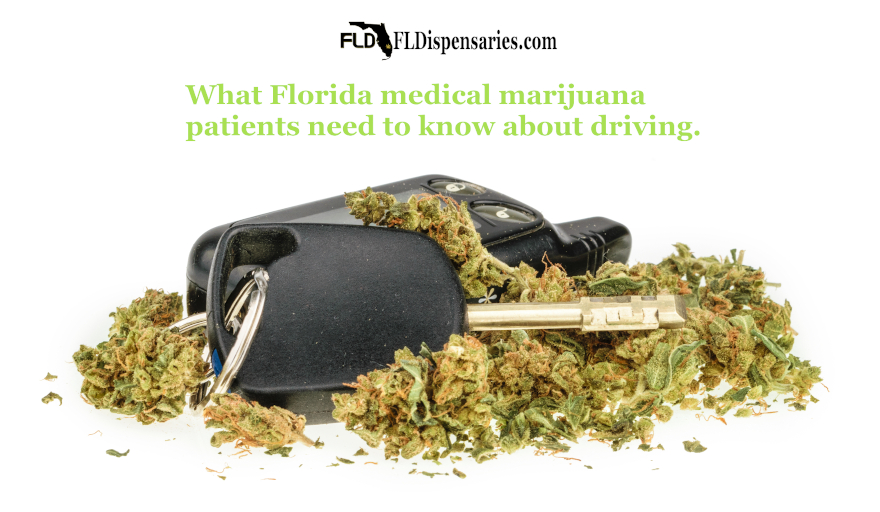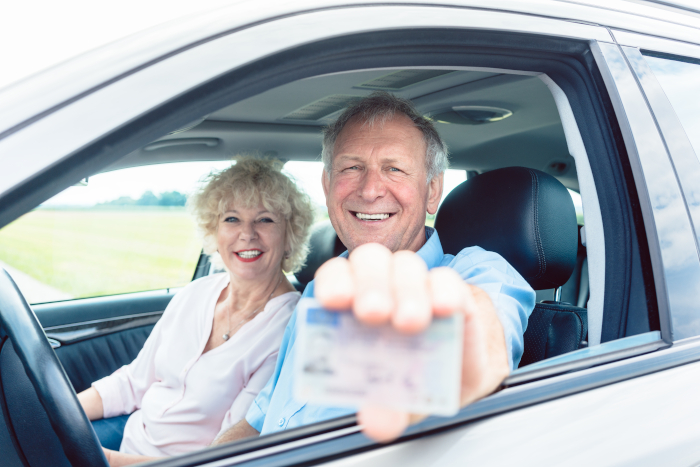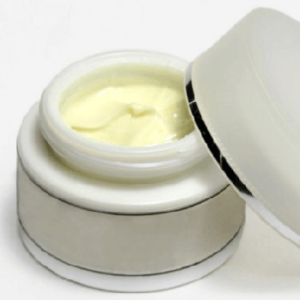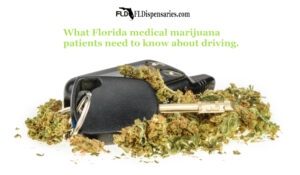

Here’s what Florida medical marijuana patients need to know about driving with cannabis as well as carrying a gun.
Is it legal to drive with medical marijuana in your car in Florida?
Can police search your car if they smell marijuana?
What are the laws and penalties pertaining to driving while under the influence of marijuana in Florida?
Are medical cannabis patients permitted to have concealed weapons permits and firearms in Florida?
Florida’s gun laws as they pertain to medical marijuana users.
Many thousands of Florida medical marijuana patients are also drivers. Unfortunately, nearly two-thirds of drivers with medical marijuana cards are either completely unaware or mostly uninformed about laws that pertain to driving with marijuana in their possession and driving under the influence of marijuana in Florida. Let’s fix that.
Marijuana is just one of an array of medicines that can cause intoxication. Most of these medicines are available by prescription only making them illegal to possess without a prescription — similar to marijuana. More importantly, regardless of whether or not someone has a prescription or Florida medical marijuana card, driving while in a state of intoxication is a serious crime in the state.
However, if you’re a card-carrying medical marijuana patient it’s perfectly legal to drive with your meds in your car. We’ll talk about the best way to do that in a moment.
First, we want to instill some fear in those who might be thinking about taking their medicine before they get behind the wheel.
Penalties for driving while under the influence of marijuana in Florida
As is the case in all U.S. states, under Florida law, driving under the influence of any intoxicant, also called DUI, is a serious crime.
While it’s fairly easy to tell if someone is drunk and easy to test for blood alcohol levels, it’s not as cut and dried — so to speak — when it comes to marijuana. You have to be fairly well stoned to be charged with driving under the influence of marijuana.
Being charged with a DUI is no fun at all. First you’ll be arrested, then you’ll be thrown in a jail cell, then you call a lawyer, then you’ll be called before a judge for an explanation. If the judge, after hearing the case presented by the police officer and your lawyer, decides your case warrants a trial things get dicey.
If you are convicted of a DUI, you’re looking at stiff fines, possibly community service commitments, a probation period, and possible imprisonment.
For a first DUI conviction in Florida the fine ranges from $500–$2,000. If there’s a minor in the car with you when you’re pulled over, the fine will be between $2,000–$4,000. And, quite often, your license will be revoked for a period of time. You might also be required to attend DUI school to get it back.
The first conviction also comes with a mandatory 50 hours of “community service.” And if you can’t perform community service there’s an additional fine of $500 fine — or $10 for each hour of community service you fail to perform.
If your case is bad enough, you could spend up to a year in jail and/or become a resident of a drug abuse treatment facility. And even if you don’t end up in the cooler, you’re looking at up to one year under probation, which is also not at all fun.
And even when all of that is all over and you get your license back, the ordeal is still not over. You might be required to pay for increased auto insurance premiums of $100,000 per person, $300,000 per occurrence, and $50,000 for property damage liability.
If you think clearly about what’s at stake you’ll come to the conclusion that it’s just not worth the risk to drive while stoned in Florida — especially with marijuana in your car. Speaking of which…
Is it legal to drive with medical marijuana in my car in Florida?
As with any medication, legitimate patients are permitted to transport them whether that means driving home from the local dispensary or off to grandma’s house.
Keep in mind, however, that although you are permitted to have medical marijuana in your car, it’s illegal to medicate while driving. That includes airplanes and boats as well as cars.
If you’re pulled over for a traffic violation and the officer smells marijuana, they will have the legal right to search your vehicle if they think you may have committed a crime, such as possessing more than the legal limit. For this reason, it’s highly recommended that you keep your Florida medical marijuana card on you, medicine in an airtight container in a locked case, compartment, or trunk.

What should I do if I am pulled over with medical marijuana in my car?
If you are pulled over with marijuana in your car, and the officer does smell it, you’ll be questioned. This is the perfect time to whip out your handy, dandy Florida medical marijuana card.
If there is suspicion of a crime, the officer will be permitted to confirm that you are indeed listed in the state’s medical marijuana registry.
Here’s what the Florida Office of Medical Marijuana Use has to say about this:
Pursuant to s. 381.987, F.S. the department allows access to confidential and exempt information in the Medical Marijuana Use Registry to law enforcement agencies that are investigating a violation of law regarding marijuana in which the subject of the investigation claims an exception established under s. 381.986, F.S.
Hopefully, aside from possibly getting a traffic ticket for the reason that you got pulled over, that will be the end of that.
Can a police officer search my car if they smell marijuana?
Even in states that have had medical marijuana for many years the debate rages on as to whether or not police can search a vehicle if they smell marijuana.
Although Article I, Section 12 of the Florida Constitution protects persons and places from unreasonable searches and seizures, police can search your vehicle if they have probable cause. The question is, does smelling marijuana constitute probable cause?
According to Florida law, probable cause means:
A fair probability that the evidence will be found, based on an objective assessment of the totality of the circumstances, viewed in light of the member’s training and experience. It means there is a reasonable basis for believing that a crime has been or is being committed, and showing that the items to be seized are at the place to be searched.
Police are also allowed to search your vehicle if you give them permission. If an officer asks you, “do you mind if I search your vehicle,” and you say yes, they’ll have a look around. So be sure that they’re not going to find anything illegal before you open your mouth.
Although historically the smell of marijuana has been considered probable cause for a search, since hemp (which smells just like marijuana) was also legalized, just a whiff of weed is not usually enough to make an officer search your car, especially if you flash your Florida MMJ card.
But again, it’s really a good idea to keep your card handy and your stash in a sealed airtight container.
How can a police officer tell if you’re driving under the influence of marijuana?
Unlike with alcohol impairment, there’s no quick roadside test for marijuana impairment. And there may never be one. That’s because the metabolites of THC can remain in your body for weeks.
Evidence of THC metabolites in your blood, saliva, hair, urine, etc. rarely holds up in a court of law these days as the sole reason for determining impairment. In order to make a solid case, the office must witness particular behaviors associated with impairment.
Police are trained to spot signs of marijuana impairment such as bloodshot eyes, sluggishness, drowsiness, impaired motor or speaking ability, and so on.
If you’ve taken a small dose of THC and aren’t high, you’ll probably pass muster. You have to be pretty obviously hammered for the officer to want to do all the sobriety tests and paperwork and appear in court to testify against you.

Are medical marijuana patients permitted to have guns in Florida?
Florida has the highest number of concealed weapons permit-holders in the country and more than 200,000 medical marijuana patients. As you might guess, many of them are gun owners. But is that legal?
Having a medical marijuana card in Florida does not automatically exclude you from owning a gun. At least not under Florida law. However, because marijuana is federally illegal, its use excludes you from the right to bear arms granted by the 2nd Amendment of the U.S. Constitution.
Sadly, if you are caught with marijuana and a gun by a federal agent, you can not only be charged with drug possession, but you’re also susceptible to the penalties of federal gun laws. Don’t take this lightly. There have been cases of people being arrested by the ATF for possessing a firearm because they had a medical marijuana card even though they had no marijuana on them at the time.
Can MMJ patients even buy a gun? Nope. In order to purchase a gun, you’ll need to fill out ATF Form 4473 which flat out asks if you’re a user of any Schedule I drug. If you tell the truth on your gun application and mention that you use marijuana, a gun shop simply cannot legally sell you a gun. You could lie about it but you’d be committing a federal felony.
What this comes down to is anyone who uses medical marijuana becomes disenfranchised from their 2nd Amendment rights and automatically prohibited from possessing or even using a gun.
The problem isn’t limited to Floridians. Federal gun laws apply nationwide without exception. In fact, law enforcement agencies in states such as Pennsylvania, Illinois, and Hawaii have given public notice to medical marijuana patients they must either turn in or dispose of their guns.
Additionally, in 2016 when the U.S. Ninth Circuit Court of Appeals ruled that the argument that medical marijuana cardholders are less likely to commit crimes is “not sufficient to overcome Congress’s reasonable conclusion that the use of such drugs raises the risk of irrational or unpredictable behavior with which gun use should not be associated.”
Learn more about driving with Cannabis, guns, and medical marijuana:
- State of Florida DUI information
- Palm Beach Post – With new hemp law, ‘sniff and search’ goes up in smoke
- Miami Herald – Medical marijuana is legal. Can Florida cops still search your car if they smell pot?
- CMClarkLaw.com – Medical Marijuana and Gun Laws: One Toke Over the Line
- Miami New Times – Guns and Pot Sometimes Don’t Mix in Florida






